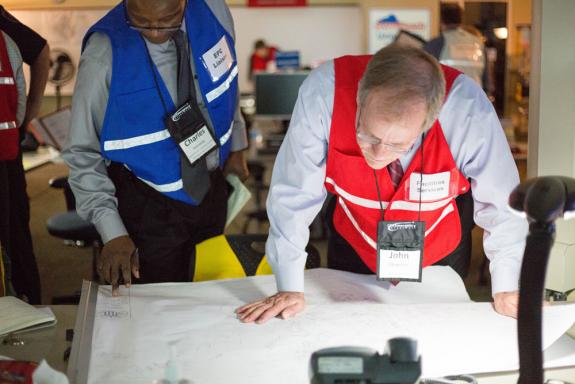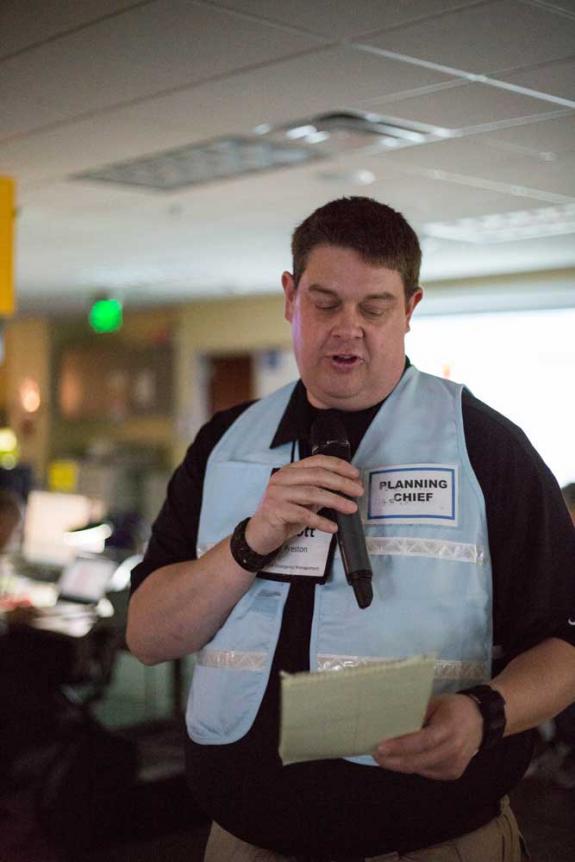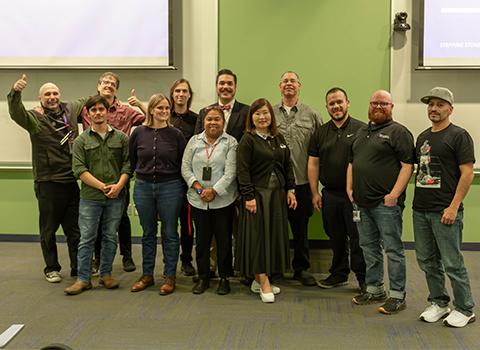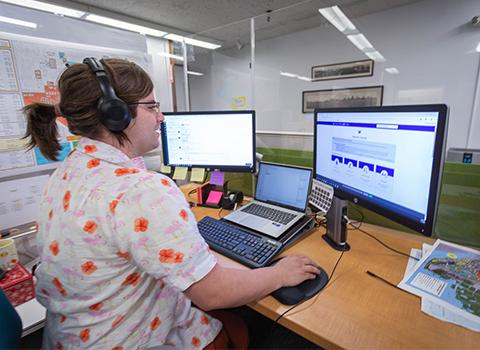Prepping for a power outage

A team of logistics coordinators meet to discuss how to respond to an emergency scenario.
In a disastrous dream schemed up by UW Emergency Management, a substation just west of campus has exploded. The power is out across most of north Seattle, including the University. Smoke clouds are billowing toward campus and generators will only last so long.
It's a good thing it isn't real.
Dozens of University personnel were tasked with responding to this fictional scenario at Thursday night’s yearly test of the University’s emergency response capabilities.
“We've had a few power outages in the recent past, so we thought this would be a very relevant scenario for us to practice,” said Emergency Management’s plans and training manager Siri McLean.
how does it work?
how does it work?
In this fictional scenario, electrical power, which is supplied to the University by Seattle City Light, is cut off and may not return for days or even a week. Emergency Management’s staff spent months planning every detail of the event, from a chemical-containing smoke cloud and the campus HVAC systems it would impact, to tweets from students, staff and faculty creating confusion.
During the training exercise, a team of scenario controllers and simulators call in to representatives with new pieces of news and information. These representatives, divided into categories such as Operations, Finance, Communications and Logistics work with each other on coordinating a response. All the while, Associate Vice President for Facilities Services Charles Kennedy serves as a liaison to the Emergency Policy Council, which makes the final call on policy matters, such as whether or not to suspend University operations.
“I know I have eight, nine, even 10 pages of notes about things we learned during this exercise so that we're better prepared for an emergency in the future,” said Kennedy.
In Thursday’s night’s drill, University staff reacted to the initial explosion, the potentially hazardous smoke cloud, keeping a hospital up and running, traffic gridlock, saving priceless research, rescuing folks from elevators and making plans for the weeks ahead to get the University back up and running.
“It’s good to practice,” said Building Services director Gene Woodard, serving as a deputy chief overseeing all coordination of University operations during the emergency. “These scenarios force us to practice the challenges we would face if we were in a real emergency. That experience is invaluable."
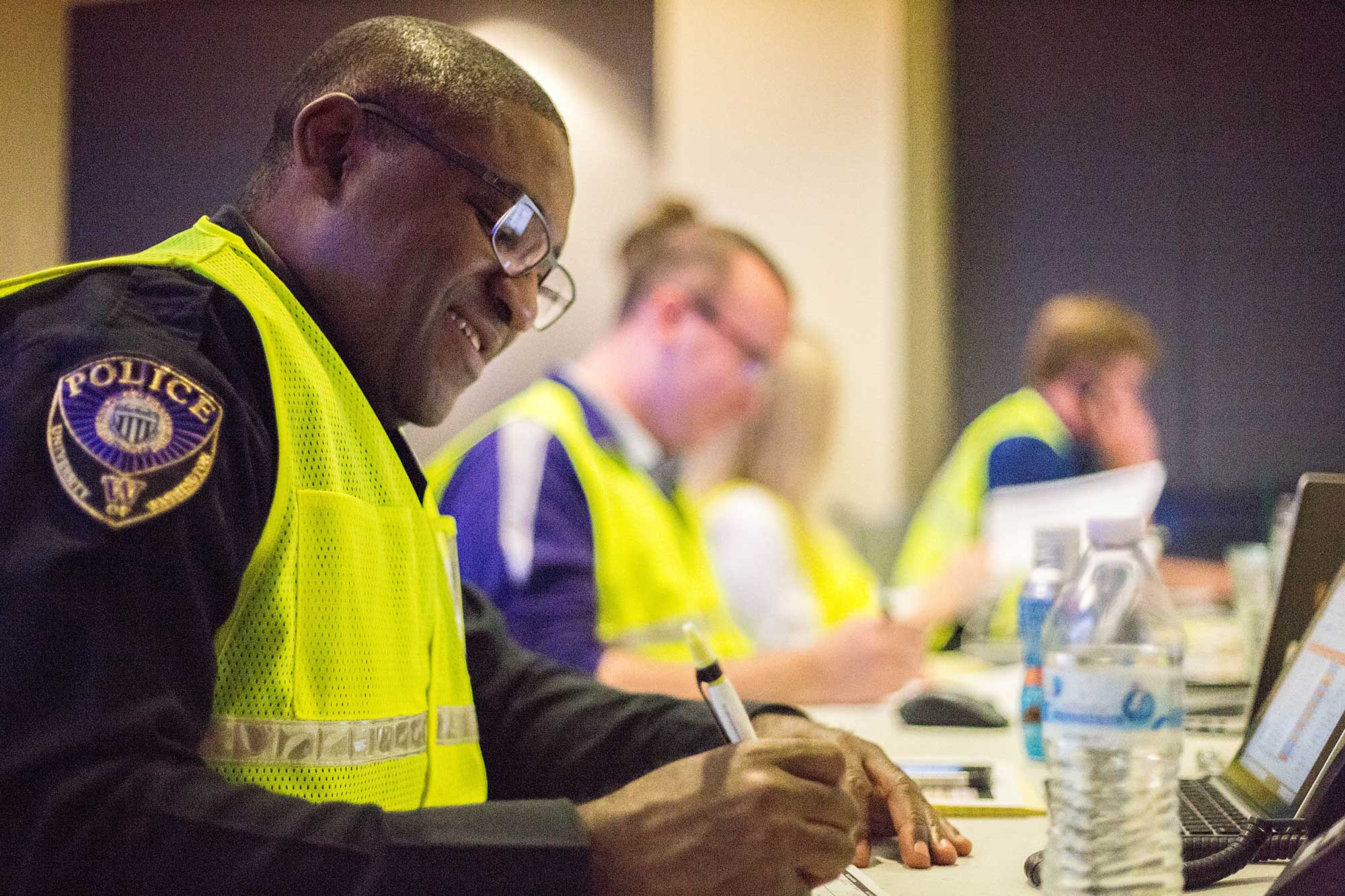
Representatives from UWPD, HFS, Facilities Services and other departments call in to the Emergency Operations Center with new pieces of news and information for the University to respond to.
partnerships
partnerships
Dozens of representatives from UW departments took part in the exercise, including Facilities Services, Student Life, UWPD, Capital Planning & Development, Athletics, UWMC and Health Sciences, Procurement, Housing & Food Services, UW-IT, News and Information, Finance & Accounting, Human Resources, the Office of the Attorney General, UW Marketing and more.
“You try and find that balance, you want to create a realistic scenario that stresses people out but doesn't overwhelm them, but you also don't want participants sitting around bored or thinking that practicing for an emergency is a waste of time,”said McLean.
Some units set up additional Unit Response Centers to support the central University EOC at UW Tower, including Transportation Services, UWMC, HFS and UW-IT.
“All of Transportation Services’ managers and directors are at the TS URC,” said transportation maintenance manager Joles Tahara. “They're helping support us, and they're also getting separate information directly from the event simulators. Part of our work is coordinating with them remotely.”
Seattle City Light and the City of Seattle also participated, alongside a handful of other emergency management professionals who served as observers who will provide feedback to the University’s response after the training exercise. These observers included emergency management professionals from King County, the Coast Guard, the City of Shoreline and Marysville School District.
"I'd like to thank Emergency Management’s Steve Charvat, Scott Preston, Siri McLean and the team for all of their hard work in preparing this event for us” said Interim Vice President for Finance & Facilities Elizabeth Cherry. “The University is better prepared for an emergency because of their efforts.”
